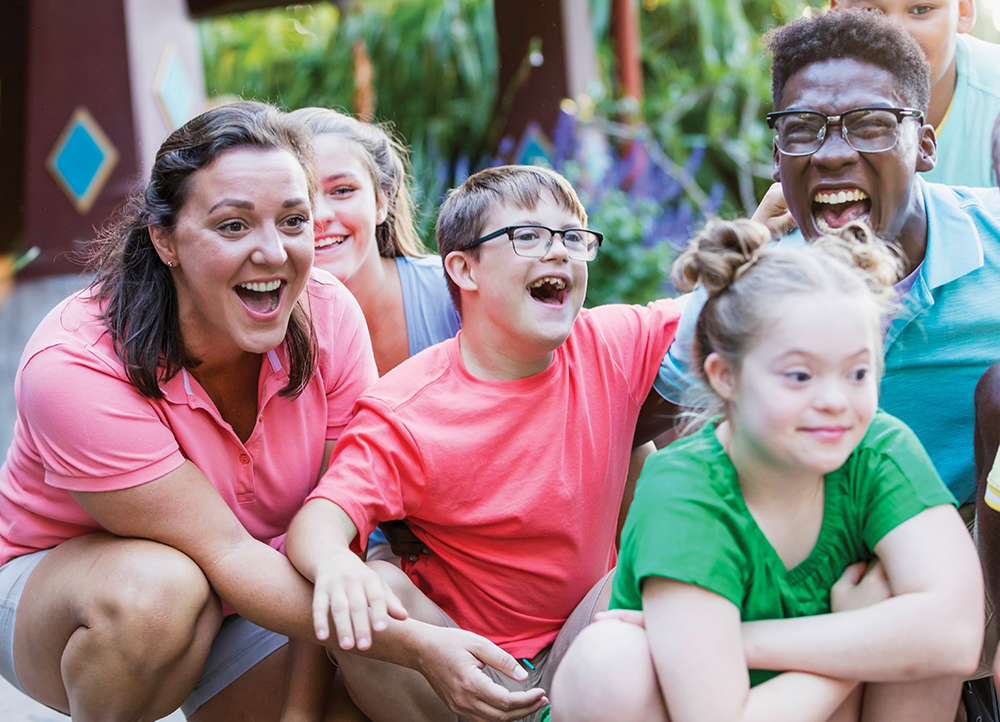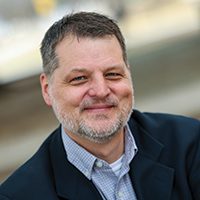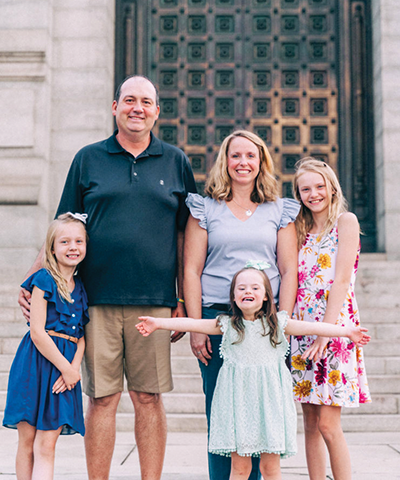COVER STORY: A Wider Welcome
Endowed Chair in School of Education Promises Expansion of Disability Research and Community Impact
Dr. Erik Carter joined the Baylor School of Education faculty in January as the Luther Sweet Endowed Chair in Disabilities, made possible as part of a $1.75 million gift to Baylor from an anonymous alumni couple.
Carter brings to Baylor an established and impactful record of research publication with significant scholarly citations and grant funding totaling $28 million. He previously held the Cornelius Vanderbilt Chair in Special Education at Vanderbilt University and co-directed the Vanderbilt Kennedy Center for Excellence in Developmental Disabilities. At Baylor, he is also executive director for the Baylor Center for Developmental Disabilities (BCDD).
Carter’s list of accomplishments and record of scholarship, chronicled in a 78-page vita, is so long that the questions are obvious. What motivates his work? What is he trying to accomplish? What does he hope to achieve at Baylor?
The answer is always the same — to change the landscape for people with disabilities and their families. His strategies for doing so have evolved over time, but they all connect back to his original entry into working with people with intellectual and developmental disabilities (IDD). He wants to make a difference, because he knows first-hand the difference inclusion made for him.
TRANSFORMATIVE ENCOUNTERS
“Like a lot of people then and now, I grew up in a community where people with intellectual disability were largely invisible,” Carter said. “They were often excluded from workplaces, schools, and even faith communities. Before I was 18, our lives never really intersected.”
That changed the summer after his freshman year of college, when he landed a job at an outdoor camp offering several programs, including one for young adults with IDD. He had applied to their main program focused on typical kids, since he had no experience with the world of disability. But a last-minute staffing shift meant his only options were to serve in the program for young adults or return home. He opted to stay and left that summer transformed.
“I was a college student who somehow came to think that my worth was found in what I could do and in my accomplishments,” he said. “And yet I was befriended by several young adults with intellectual disability who liked and loved me irrespective of those things. The things our culture prizes so highly are not at all what makes us lovable or valuable. Their embrace upended where I thought worth came from. Through these friendships, I experienced belonging.”
These peers were also Christians, and Carter was not.
“I also encountered a faith that was so very attractive and true,” he said. “These new friends shared their deep love for Jesus. They worshipped with joy and abandon. They knew for certain they belonged to God. And through the lived-out testimonies of Wayne, Margaret, John Ray, and others, I became a Christian.”
The experience also revealed a calling. “I wanted to play a role in helping people encounter a part of the community that they were prone to overlook,” he said. “And that’s what I’ve been doing the last 30 years, creating opportunities for people with and without intellectual disability to stumble into relationships with each other—to flourish and be transformed together.”
A NEW PATH
At the time, there was nowhere in the country to study this intersection of faith and disability. Carter transferred to Wheaton College to study Christian education and then pursued graduate work at Vanderbilt to study special education. Although his initial interest was in helping churches widen their welcome, the master’s program took him into local schools, where he discovered classrooms as places where peer relationships could also form and flourish.
“Over and over, we saw the incredible impact of friendships among adolescents with and without IDD. But those friendships too often evaporated after graduation,” he said. He concluded that belonging needs to happen not just in schools and churches but also in colleges and workplaces — everywhere.
After completing his master’s degree, Carter worked as a special educator in Northeast ISD in San Antonio, where he developed a transition program connecting students to paid employment and community activities. In just two years, the program grew from eight to 30 students.
At this time in the late 1990s, educational mandates for inclusion were new. Carter saw that schools were struggling to respond, and he realized research could be instrumental in guiding needed improvements. That led him back to Vanderbilt for a PhD.
“I didn’t really aspire to be a researcher,” he said. “I just wanted to help schools and communities widen their welcome and strengthen their support. I knew our work had to be grounded in rigorous and relevant research. How do you know what policies and practices to push for? Yes, we must be guided by strong values. But we should also be grounded in the best of what we know works. Some practices will lead toward inclusion and belonging; others will lead away from these goals. Good research can help us discern the difference.”
UNIVERSAL BENEFITS
In his advocacy for inclusion and belonging in our communities, Carter is quick to point out the reciprocity of this endeavor.
“I am certain I supported Margaret, Wayne, and John Ray in some important ways.” he recalled. “But I also had much to gain from encountering their friendship and their faith. This is at the heart of belonging — we are each befriended, needed, and loved by one another.”
Carter’s research, which sometimes includes interviewing people with and without IDD who attend inclusive classrooms and congregations, bears out this truth. “They talk about the changes in their attitudes and expectations and the friendships they form,” he explained. “They discover new things about themselves and each other. They say they are better together.”
This understanding of inclusion as a mutual endeavor aligns with the Apostle Paul’s metaphor of the church, Carter said. “The body of Christ has many members, all of which are essential to its thriving,” he said. “People with intellectual disability are not optional; they have gifts that make them indispensable. Part of my research is trying to capture that flourishing. Yes, inclusion is good for people with disabilities, who are so often excluded, but it’s equally good for everyone else.”
Carter’s most recent research involves the first national study of disability and ministry in the church. His team interviewed church and ministry leaders about the origins and facets of their ministry, as well as its impact on families and congregations as a whole.
Churches often initially think they need to start a new program, Carter said. “But it’s much less about starting formal programs and more about coming alongside individuals and their families. There are times when it makes sense to launch a formal ministry, but it is through having friendships and valued roles that people are assured they belong.”
FERTILE GROUND
Carter is committed to launching a new institute on faith and disability at Baylor, pursuing research aimed at helping churches, schools, and communities be more inclusive.
“My dream is for Baylor to be the leader at this intersection of faith and disabilities —
a place where the best theological reflection joins the best empirical research to guide the everyday practices of local churches,” he said. “Baylor is already a leader in the study of religion, in the training of ministry leaders and educators, and in service delivery for people with IDD. The ground is so fertile here. We are now seeking partners and supporters — from within and beyond Baylor — who can help us call, equip, and support churches in this essential area.”
The Baylor Center for Developmental Disabilities is central to the work. “Our mission is to promote the flourishing of people with disabilities, their families, and communities,” Carter said. Plans include expanding the clinical work done through the Center to support more individuals and families, in addition to carrying out rigorous scholarship, community outreach, and training for Baylor students and scholars.
Dr. Shanna Hagan-Burke, dean of the School of Education, has known Carter through her work in special education and is certain he is the perfect fit at Baylor, both for the School of Education and the University at large.
“Dr. Carter’s work — advancing knowledge through research and leading outreach to faith communities — embodies Baylor’s motto of ‘Pro Ecclesia, Pro Texana’ and furthers the University’s mission of Christian service on a worldwide level,” she said.
“Dr. Carter’s program of research on faith and flourishing will advance Baylor’s strategic goals in new and exciting ways,” she said. “And his considerable research accomplishments add to Baylor’s scholarship profile across a range of interrelated disciplines focused on human flourishing, inclusion, and belonging.”
Photo credits —
Top: kari9/Canva
Erik Carter: Baylor Photography
Family: Jake Muller on Disability is Beautiful


